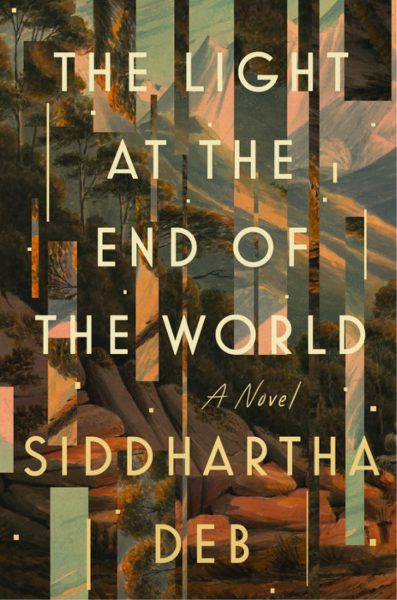Pricing
Hardcover $27.00
eBook $14.99
Description
Connecting India’s tumultuous 19th and 20th centuries to its distant past and its potentially apocalyptic future, this sweeping tale of rebellion, courage, and brutality reinvents fiction for our time.
Delhi, the near future: a former journalist goes in search of answers after she finds herself stripped of identity and citizen...
Connecting India’s tumultuous 19th and 20th centuries to its distant past and its potentially apocalyptic future, this sweeping tale of rebellion, courage, and brutality reinvents fiction for our time.
Delhi, the near future: a former journalist goes in search of answers after she finds herself stripped of identity and citizenship and thrust into a vast conspiracy involving secret detention centers, government sanctioned murders, online rage, nationalist violence, and a figure of shifting identifies known as the “New Delhi Monkey Man.”
Bhopal, 1984: an assassin hunts a whistleblower through a central Indian city that will shortly be the site of the worst industrial disaster in the world’s history.
Calcutta, 1947: a veterinary student’s life and work connect him to an ancient Vedic aircraft.
And in 1859, a detachment of British soldiers rides towards the Himalayas in search of the last surviving leader of an anti-colonial rebellion.
These timelines interweave to form a kaleidoscopic, epic novel in which each section is a pursuit, centered around a character who must find or recover crucial but hidden truths in their respective time. The Light at the End of the World, Siddhartha Deb’s first novel in fifteen years, is a magisterial work of shifting forms, reminiscent of Cloud Atlas and Underworld.
Media
“Extraordinary . . . I was in awe of Deb’s imagination and razor-sharp prose. The hallucinatory quality of his narrative reminded me of William Burroughs’s ‘Naked Lunch,’ while its apocalyptic trajectory had echoes of Cormac McCarthy’s ‘Blood Meridian’ . . . That the novel invokes a glorious past, hints at a utopian future and contradicts reality could be the author’s way to protest an authoritarian government skilled in just that . . . Whatever the author’s intent, I felt privileged to have been on an odyssey quite unlike any other.”
—Abraham Verghese, The New York Times Book Review
“The Light at the End of the World is full of intriguing puzzles and opacities, but what brings it to life is less its inventiveness than its galvanizing anger, its outraged awareness of exploitation and cruelty. It travels, unbounded, into the past and the future, yet it always meets the reader in the middle of these destinations, the broken world of the present.”
—Sam Sacks, The Wall Street Journal
“An epic story that spans centuries and weaves together in unexpected and thought-provoking ways.”
—BookBub
“Mixing fact and fiction, realism and mythology, Deb offers an unrestrained, inventive, and utterly absorbing re-imagining of India’s history and present day.”
—Bustle
“An epic, time-traveling portrait of India featuring spacecraft, spirits and aliens.”
—The Recast, POLITICO
“Deb constructs an intricate version of an India where the historical present connects to a parallel sci-fi world. Light is an epic that calls to mind David Mitchell, Octavia Butler, and Gabriel Garcia Marquez, but the author creates his own particularly chilling atmosphere.”
—Bethanne Patrick, CultureWag
“A work of genius—impassioned, singular, hallucinatory, uncanny—Siddhartha Deb has invented a new kind of subcontinental novel.”
—Karan Mahajan, author of The Association of Small Bombs
“An ambitious, century-spanning book . . . Myth blends into technology, beast into human, and flesh into machine in Deb’s chilling, precisely rendered prose. An indelible, prophetic novel.”
—Madhuri Vijay, author of The Far Field
“Big, ambitious, inventive, sweeping, and instantly addictive, The Light at the End of the World announces itself as a new kind of Great Indian Novel—a kind I’ve been craving. I was instantly hooked.”
—Sanjena Sathian, author of Gold Diggers
“An ambitious, century-spanning book . . . Myth blends into technology, beast into human, and flesh into machine in Deb’s chilling, precisely rendered prose. An indelible, prophetic novel.”
—Madhuri Vijay, author of The Far Field
“Siddhartha Deb has captured the darkness of India today in this ghostly and chilling novel. It is hard to think of finer writers and harder still to think of writers that can match Deb’s grace and talent when writing about this terrifying, turbulent world of ours.”
—Fatima Bhutto, author of Songs of Blood and Sword
“A robust collage that reflects a rich, uncanny imagination. In the wide-ranging, rhapsodic novel The Light at the End of the World, unearthed stories illuminate the coverups in the official versions of history.”
—Foreword Reviews, Starred Review
“Deb exquisitely blends India’s past, present, and future in a brilliant, phantasmagoric pilgrimage across time, space, and dimension . . . Combining elements of magical realism and Indian history and mythology, The Light at the End of the World is an imaginative, mind-bending reading experience.”
—Booklist, Starred Review
“Abundantly and realistically detailed, yet spiked with fantastical elements from mysterious cellphone messages to a ticktock army, the four main sections are so rich and so freighted with ideas that each could stand alone as its own novel. Linking them serves to create a strong sense of life in India and a sink-into-it read for lovers of big books. Highly recommended for readers interested in history, politics, and literary fiction.”
—Library Journal, Starred Review
“An ambitious and phantasmagoric epic . . . Like Gabriel Garcia Marquez, the author uses magic realism to shed new light on historical events. Filled with poetic imagery and dialogue, and subtle connections among the stories, this is a novel to get lost in.”
—Publishers Weekly
“A visionary novel . . . Deb has accessed the omnivorous, madcap spirit of Midnight’s Children–era Salman Rushdie.”

